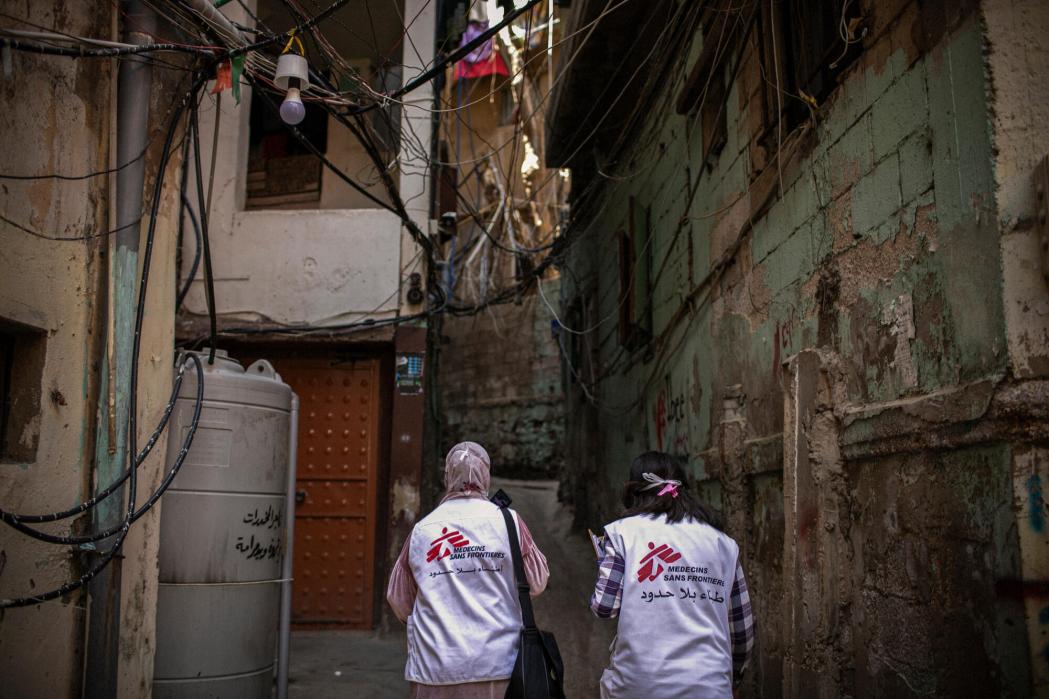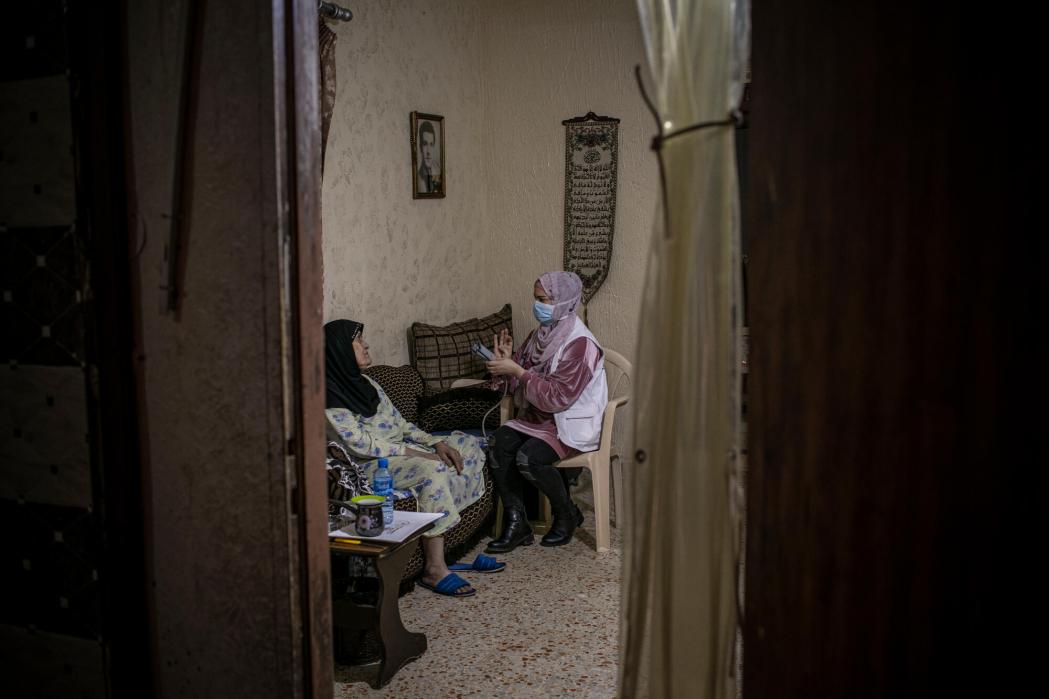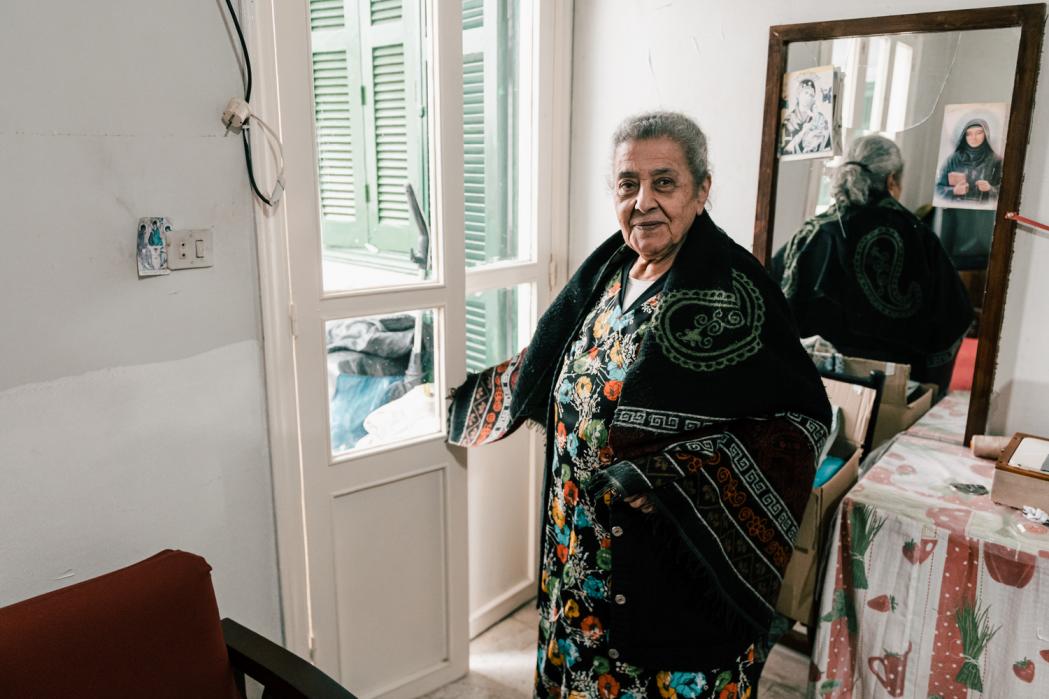In Lebanon, MSF provides care amid overlapping crises

Dayana Tabbarah, MSF health promoter, and Hala Hussein, MSF nurse, in the streets of Burj al-Barajneh camp, Beirut. Together, they visit houses of patients who have agreed to participate in the shielding approach recently put in place by MSF in the camp. © Diego Ibarra Sánchez
Since late 2019, Lebanon has been grappling with its worst economic crisis in decades, social unrest and political turmoil. On top of that, and following the arrival of the COVID-19 pandemic at the start of 2020, a major explosion tore through the capital, Beirut, in August. These overlapping crises have exacerbated people’s vulnerability and pushed thousands into poverty. All this comes in addition to a protracted displacements situation, with the small country hosting the largest number of refugees per capita in the world.
The frail public health system, which was already facing regular shortage of drugs and other medical supplies due to the financial crisis, has also struggled to cope with the growing number of COVID-19 cases, which rose from less than 200 cases a day before the blast to an average of 1,500 cases per day in December 2020. To date, a total of over 199,000 cases have been reported.

Hala, MSF nurse, is measuring Mousera’s blood pressure level as part of the regular procedure during shielding visits. Mousera, a 73-year-old Lebanese woman, suffers from hypertension, asthma and back pain, and is considered at higher risk of contracting COVID-19. She lives alone at her house in Burj al-Barajneh camp, Beirut. © Diego Ibarra Sánchez
Since August 2020, MSF has stepped up its efforts to respond to the COVID-19 pandemic response in Lebanon and support the national health system in dealing with the pandemic. The organisation has temporarily turned its hospital in Bar Elias, in the Bekaa Valley, into a COVID-19 facility and is supporting an isolation center in Sibline, in the south of the country.
Surviving the blast
Thérèse, aged 85, lives in Karantina, a neighbourhood near the Beirut port that was heavily affected by the enormous blast on 4 August 2020. Although she was only slightly wounded, her apartment was damaged in the explosion. Her sewing machine was broken, depriving her of her only source of income.

Thérèse, 85, a resident of Karantina, Beirut, Lebanon. Her sewing machine was broken in the explosion, depriving her of her only modest source of income. © Karine Pierre/Hans Lucas
“The blast destroyed all the windows in my apartment. I was on the balcony when it happened and I was knocked to the floor. My head was bleeding and I had injured my leg on some shattered glass. The shock from the fall also worsened my back pain. Some shelves and my bed were broken. This is why I’m sleeping on the couch in my living room now and using the bedroom to store all the damaged furniture. I’m sewing new curtains by hand with old fabrics to replace the ones that were destroyed.”
Since then, this former tailor has mostly relied on community solidarity and humanitarian assistance to meet her basic needs. “I was still doing some small sewing jobs before the explosion, even though I had some back pain and diminishing eyesight. I have some savings and I’m receiving cash assistance from an international organisation. A local association is also bringing me food boxes several times a week. I can barely walk and I rarely go outside, but my neighbours are helping me a lot. Some former clients also stop by from time to time to check on me. All in all, I manage to make it through.”
The blast is not all that Thérèse has to deal with. “When the doctor from Doctors Without Borders came, he told me I have diabetes. I never had diabetes before. My hypertension has also increased lately. I think this is all linked to the explosion. I’m being very careful to take my medicines every day and eat healthy because I couldn’t afford the hospital fees if I should have any serious medical issues.”
Still, she remains hopeful. “It has been a stressful time for everyone, but I’m old already and I feel I’ve had a good life. For the younger generations though, I don’t know what will happen… We have to keep faith.”
Care in crises
One of those working in Lebanon, specifically in Bar Elias, treating patients like Thérèse, is Filipino doctor Karina Aguilar. Karina is the Medical Activity Manager of the hospital in Bar Elias, and describes the work they do. “Doctors Without Borders' hospital in Bar Elias used to provide non-urgent surgery, such as for hernias, haemorrhoids and cysts, and gynaecological surgery, as well as post-wound care, such as foot injuries linked to diabetes and wounds from ulcers.”
“In mid-September 2020, we have switched our activities to respond to the increase of COVID-19 cases in Lebanon and are now operating a 20-bed hospital catering to confirmed COVID-19 patients. We have 5 beds in the ICU and 15 beds for the inpatient department. In addition to medical care, Doctors Without Borders provides physiotherapy and mental health services for all the COVID-19 patients. A health promotion team also raises awareness on prevention, shielding and the danger signs related to COVID-19.”
With the pandemic, the economic crisis and the explosion, they have seen so many patients in the hospital. She recalls, “At the start of the project in Bar Elias, back in 2017, the people who primarily came to us for medical help were the Syrian and Palestinian refugees, and migrant workers, either living in the surrounding area or referred to us by other health structures in the country. But now, with the economic crisis here in Lebanon, more and more people need our help because many, including within the Lebanese population, can no longer afford medical care. This is even truer now, with COVID-19. I’ve encountered all kinds of people: Lebanese, Syrians, Palestinians, rich, poor, middle class, etc. Most of them fear losing their loved ones, and not being able to see them because visitors are not allowed inside the hospital. We reassure them that we will do everything we possibly can, and that our team will update the family every day on the status of the patient. Our patients often feel isolated inside the rooms, and they are visited by our mental health team every day, to reassure them they are not alone.”
Karina has been with Doctors Without Borders since 2012. Despite the grim circumstances, Karina, like Thérèse, is hopeful. “I believe that every human being has a right to quality medical and surgical care. With Doctors Without Borders, I am able to treat the patients who need it the most, with little to no compromise on quality. I have been to places that no one even thought of going, delivering healthcare to people who would walk for days just to be able to see a doctor. This is important especially during these times, when there is a pandemic, and more so in a country that is in the midst of an economic crisis. I am happy to think that people who, under normal circumstances, would likely die at home because they cannot afford the treatment for COVID-19, have the chance to get treated in our hospital for free.”
She adds, “Seeing our patients’ faces when they are discharged, and their messages of gratitude for our services, is a great feeling.”
Karina Marie Vera Aguilar has been working with Doctors Without Borders / Médecins Sans Frontières (MSF) since 2012. She has worked in projects from Pakistan and Yemen to Haiti and Afghanistan. In 2020 she finished her mission for Doctors Without Borders Bamenda project in Cameroon, where she served as Medical Activity Manager. After that, she worked in Lebanon.